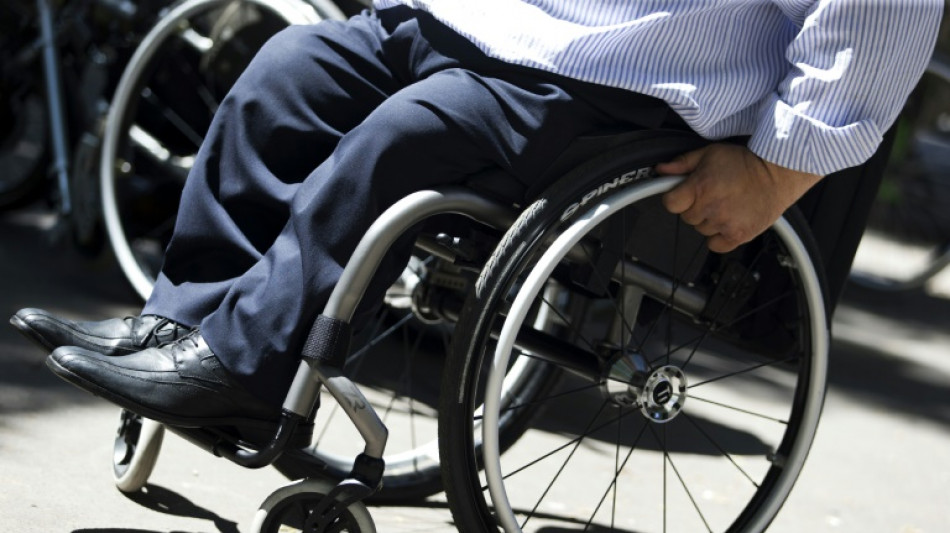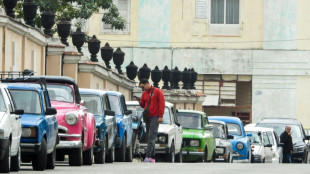
-
 Djokovic hints at retirement as time seeps away on history bid
Djokovic hints at retirement as time seeps away on history bid
-
US talking deal with 'highest people' in Cuba: Trump

-
 UK ex-ambassador quits Labour over new reports of Epstein links
UK ex-ambassador quits Labour over new reports of Epstein links
-
Trump says closing Kennedy Center arts complex for two years

-
 Reigning world champs Tinch, Hocker among Millrose winners
Reigning world champs Tinch, Hocker among Millrose winners
-
Venezuelan activist ends '1,675 days' of suffering in prison

-
 Real Madrid scrape win over Rayo, Athletic claim derby draw
Real Madrid scrape win over Rayo, Athletic claim derby draw
-
PSG beat Strasbourg after Hakimi red to retake top spot in Ligue 1

-
 NFL Cardinals hire Rams' assistant LaFleur as head coach
NFL Cardinals hire Rams' assistant LaFleur as head coach
-
Arsenal scoop $2m prize for winning FIFA Women's Champions Cup

-
 Atletico agree deal to sign Lookman from Atalanta
Atletico agree deal to sign Lookman from Atalanta
-
Real Madrid's Bellingham set for month out with hamstring injury

-
 Man City won't surrender in title race: Guardiola
Man City won't surrender in title race: Guardiola
-
Korda captures weather-shortened LPGA season opener

-
 Czechs rally to back president locking horns with government
Czechs rally to back president locking horns with government
-
Prominent Venezuelan activist released after over four years in jail

-
 Emery riled by 'unfair' VAR call as Villa's title hopes fade
Emery riled by 'unfair' VAR call as Villa's title hopes fade
-
Guirassy double helps Dortmund move six points behind Bayern

-
 Nigeria's president pays tribute to Fela Kuti after Grammys Award
Nigeria's president pays tribute to Fela Kuti after Grammys Award
-
Inter eight clear after win at Cremonese marred by fans' flare flinging

-
 England underline World Cup
credentials with series win over Sri Lanka
England underline World Cup
credentials with series win over Sri Lanka
-
Guirassy brace helps Dortmund move six behind Bayern

-
 Man City held by Solanke stunner, Sesko delivers 'best feeling' for Man Utd
Man City held by Solanke stunner, Sesko delivers 'best feeling' for Man Utd
-
'Send Help' debuts atop N.America box office

-
 Ukraine war talks delayed to Wednesday, says Zelensky
Ukraine war talks delayed to Wednesday, says Zelensky
-
Iguanas fall from trees in Florida as icy weather bites southern US

-
 Carrick revels in 'best feeling' after Man Utd leave it late
Carrick revels in 'best feeling' after Man Utd leave it late
-
Olympic chiefs admit 'still work to do' on main ice hockey venue

-
 Pope says Winter Olympics 'rekindle hope' for world peace
Pope says Winter Olympics 'rekindle hope' for world peace
-
Last-gasp Demirovic strike sends Stuttgart fourth

-
 Sesko strikes to rescue Man Utd, Villa beaten by Brentford
Sesko strikes to rescue Man Utd, Villa beaten by Brentford
-
'At least 200' feared dead in DR Congo landslide: government

-
 Coventry says 'sad' about ICE, Wasserman 'distractions' before Olympics
Coventry says 'sad' about ICE, Wasserman 'distractions' before Olympics
-
In-form Lyon make it 10 wins in a row

-
 Man Utd strike late as Carrick extends perfect start in Fulham thriller
Man Utd strike late as Carrick extends perfect start in Fulham thriller
-
Van der Poel romps to record eighth cyclo-cross world title

-
 Mbappe penalty earns Real Madrid late win over nine-man Rayo
Mbappe penalty earns Real Madrid late win over nine-man Rayo
-
Resurgent Pakistan seal T20 sweep of Australia

-
 Fiji top sevens standings after comeback win in Singapore
Fiji top sevens standings after comeback win in Singapore
-
Alcaraz sweeps past Djokovic to win 'dream' Australian Open

-
 Death toll from Swiss New Year bar fire rises to 41
Death toll from Swiss New Year bar fire rises to 41
-
Alcaraz says Nadal inspired him to 'special' Australian Open title

-
 Pakistan seeks out perpetrators after deadly separatist attacks
Pakistan seeks out perpetrators after deadly separatist attacks
-
Ukraine war talks delayed to Wednesday, Zelensky says

-
 Djokovic says 'been a great ride' after Melbourne final loss
Djokovic says 'been a great ride' after Melbourne final loss
-
Von Allmen storms to downhill win in final Olympic tune-up

-
 Carlos Alcaraz: tennis history-maker with shades of Federer
Carlos Alcaraz: tennis history-maker with shades of Federer
-
Alcaraz sweeps past Djokovic to win maiden Australian Open title

-
 French IT giant Capgemini to sell US subsidiary after row over ICE links
French IT giant Capgemini to sell US subsidiary after row over ICE links
-
Iran's Khamenei likens protests to 'coup', warns of regional war


New hope to help advanced Parkinson's patients walk, sleep again
People with advanced Parkinson's disease often struggle to walk more than a few steps or sleep through the night, but new research offers hope of relief from these two debilitating symptoms.
Suffered by millions worldwide, the degenerative disease erodes motor functions and in its later stages often confines patients to a bed or wheelchair.
This is due to a condition called orthostatic hypotension, which occurs when a person stands up and their blood pressure drops, causing dizziness and even fainting after a couple of steps.
For Parkinson's sufferers, it happens because a regulator in the brain -- which normally ensures sufficient blood flows to the brain when we stand up -- has been disrupted.
But new French research published in the New England Journal of Medicine last week found that a spinal cord implant could help advanced Parkinson's patients get back on their feet.
- Quality of life improved -
Earlier this year neurosurgeon Jocelyne Bloch and Gregoire Courtine revealed that such an implant had enabled three paralysed people to walk again.
Both were also involved in the latest research, which tested a similar implant on a 48-year-old woman.
While the woman did not have Parkinson's, she had such similar symptoms -- including orthostatic hypotension -- that she was initially diagnosed with the disease.
For paralysed people, the spinal cord implant mimics how the brain sends electrical pulses to muscles, reconnecting a severed link.
But for orthostatic hypotension, it stimulates the regulator in the brain that senses the need to send more blood when people stand upright.
Before receiving the implant, the woman would faint after a taking a few of steps.
Three months after the surgery, she was able to walk more than 250 metres (820 feet) with the help of a walking frame, the study said.
"She is not cured, she would not run a marathon, but this surgery has clearly improved her quality of life," Bloch told AFP.
However it is a single case and further research is needed, particularly involving Parkinson's patients.
It is not yet certain that the form of orthostatic hypotension seen in Parkinson's patients can be fixed solely by stimulating the regulator the implant targets.
- Anti-insomnia pump -
Insomnia is another common scourge of the 10 million Parkinson's sufferers globally, more than three quarters of whom have sleep-related symptoms, according to the Parkinson's Foundation.
Sleep can be affected by uncontrolled shaking which wakes patients up, while another factor is a lack of a dopamine, common in people with Parkinson's.
The medication apomorphine is normally used to replace dopamine, lessening symptoms such as shaking and stiffness.
But when taken orally, the drug can cause dopamine to spike and then drop, leading to muscle spasms.
A device similar to an insulin pump that delivers continuous apomorphine throughout the night could solve the problem, according to a study published in the journal Lancet Neurology on Thursday.
Co-author Emmanuel Flamand-Roze led previous research indicating that such a pump would help with Parkinson's, but the new study looked at how it helped with sleep.
The randomised study found that those using the pump had "significantly improved" sleep compared to those who received a placebo.
Flamand-Roze told AFP that "the constraints linked to wearing a small pump" are much lower during the night, compared to carrying such a device around all day.
However because the study had a small sample size -- fewer than 50 people -- and focused on people at an already advanced stage of Parkinson's, further research is needed.
D.Cunningha--AMWN



